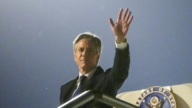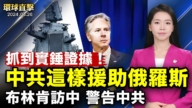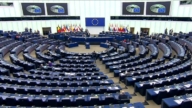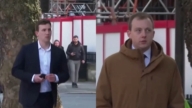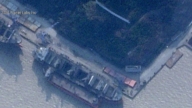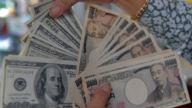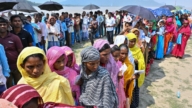【新唐人2014年05月09日訊】台灣「親民黨」主席宋楚瑜,5月6號起率團到北京訪問。7號,他和中共領導人習近平會面的消息,被國際媒體關注,至於他在會面時提出的「四個體諒」,中國的媒體則隻字未提。由於宋楚瑜是台灣「3.18太陽花學運」之後,第一位到大陸參訪的政治人物,此行的目地,格外令外界關注。
正在北京訪問的台灣「親民黨」主席宋楚瑜,8號上午,前往「北京大學」,為自己的著作舉辦發表會。
宋楚瑜自2010年4月參加「上海世博會」後,有4年的時間,沒有前往大陸訪問。這幾年,他經歷喪妻之痛後,都在休息、調養。同時,他也是台灣3月發生「太陽花學運」之後,第一位到大陸參訪的政治人物,因此,宋楚瑜這次率團訪問北京,被稱為「復出」、「意義非凡」。
這也是台灣發生「反服貿」學運之後,中共領導人習近平首次提出中共的立場。習近平7號在北京會見宋楚瑜時,首次向台灣學生喊話,他說,兩岸青少年身上寄託著兩岸關係的未來,「要多想些辦法、多創造些條件、讓他們多來往、多交流」。
美國中文雜誌《中國事務》總編輯伍凡﹕「宋楚瑜這次去(中國),是代表泛藍的一部分,但是他不是代表大財團,他是代表下層的企業家、工人、學生。那麼國民黨馬英九另外一批人是代表大財團。」
台灣中華經濟研究院研究員吳惠林﹕「現在兩岸關係好像已經觸礁了,(兩岸當局)原來是要利用兩岸簽訂服貿,然後再進一步統合,不過,就是因為手段太過粗糙,被年輕的學生意識到了,所以3.18太陽花學運就出現了,敲醒台灣人警覺,這個問題好像很大。」
宋楚瑜在與習近平會面時提出「四個體諒」﹕多體諒台灣同胞的台灣意識,但台灣意識不等於臺獨意識﹔多認識和體諒最近台灣的自主性公民意識,畢竟台灣跟大陸政治和社會制度不一樣﹔台灣是個多元社會,大陸應多體諒台灣的民主體制﹔和台灣經濟多元自主,很多中小企業白手起家、在各地打拚,請多體諒他們的處境。
伍凡﹕「那麼,他(宋楚瑜)把這個情況向習近平介紹,希望習近平要知道,你在解決台灣問題上,不顧到這批中小企業和下層人的……他們的情緒,他們利益的訴求,他們對大陸的看法,那你中共要解決台灣問題恐怕會遇到很大的困難。」
不過,宋楚瑜8號接受媒體採訪時強調,他「從頭到尾」沒有提及太陽花。
而兩岸後續協議,是否受到台灣「反服貿」的影響而延宕?習近平在會面時意有所指的說,「經濟融合有利兩岸互利雙贏,任何時候都不應受到干擾。」
吳惠林﹕「這個問題並不只是服貿協議的本身,大家非常憂慮(台灣)香港化,另外就是言論的自由、出版的自由、人權方面或是民主方面就會受到非常大的戕害。所以年輕人意識到他們的未來,因為未來是屬於他們的,他們拒絕被我們這一代人把他出賣掉了,所以他們就發聲。」
台灣「中華經濟研究院」研究員吳惠林還提出另一個台灣需要擔憂的現象。
吳惠林﹕「那現在中國經濟已經瀕臨非常大的泡沫,已經要破滅了,是不是又要從台灣把資金吸引過去﹖台灣現在經濟也不是那麼好,所以如果在這一次的服貿簽成,兩岸經貿又更加的擴大,是不是台灣資金——血(會)被吸乾。」
吳惠林猜測,是不是習近平發現他們的訊息有問題,一方面也想從宋楚瑜這個渠道,去得到代表台灣底層的真正看法,所以才安排宋習會。
吳惠林﹕「另一方面可能在政治方面對於馬政府已經失望了,是不是有這樣一種味道呢﹖不管是怎麼樣,現在看起來好像他都要探詢台灣的民意,尤其是年青人。那到底下一步,服貿、貨貿的情況,說不定整個步調,就會作一番的調整了。」
不過,宋楚瑜提出的「四個體諒」,中國媒體則通通刪除,只字未提。
採訪/朱智善 編輯/周平 後製/孫寧
Mainland Media Ignore Soong’s ‘Four Understandings’
Taiwan’s People First Party (PFP) Chairman James Soong
led a delegation to visit Beijing on May 6.
His meeting with the Chinese leader Xi Jinping on the 7th
drew international media attention.
However, his ‘four understandings’ was completely ignored
by the mainland media.
As the first politician visiting China after the 3.18 Taiwanese
student movement, Soong’s visit to China brought particular
attention.
The PFP Chairman James Soong arrived in Peking University
to present his recent publication on the morning of the 8th.
Soong’s last visit to China was the Shanghai World Expo in
April 2010. Since then, he had been recovering from the
death of his wife.
As the first Taiwanese politician to visit China since the Sunflower
student movement in March, Soong ‘s visit to Beijing was
claimed to be ‘comeback’ and ‘significant’.
Chinese leader Xi Jinping also brought up the position of the
Chinese Communist Party (CCP) since the cross-strait pact
protest in Taiwan.
In his meeting with Soong on the 7th, Xi said to allow the
youths cross-strait to conduct more interaction and
communication for mutual and future cross-strait relations.
Wu Fan, China Affairs magazine editor-in-chief: “Soong has
visited China on behalf of the pan-blue camp, not the financial
sectors, but the middle class entrepreneurs, workers, and
students.
The KMT Ma Ying-jeou will be for people of the financial-
the corporate sectors."
Wu Hui-lin, Chung-Hua Institution for Economic Research
researcher: “Cross-strait relations now seem to have hit
the rocks.
It was originally intended to integrate through the economic
pact.
However, the rough proceeding was recognized by the students,
and thus the student protest took place and woke up the
Taiwanese. Suddenly they realize the issue is big."
Soong brought up the ‘four understandings’ during his meeting
with Xi Jinping:
Understanding Taiwan compatriots in Taiwan consciousness,
which is not equivalent to Taiwan independence;
Understanding Taiwan’s civic autonomy with the fundamental
difference in politics and social system between Taiwan and
mainland China;
Understanding Taiwan’s democracy and pluralistic society;
Understanding Taiwan’s independent and pluralistic economy
consisting of many small and medium enterprises.
Wu Fan, China Affairs magazine editor-in-chief:
“He introduced to Xi Jinping that to solve the issue of
Taiwan, the emotions, the needs and the opinions of these
SMEs and the grassroots people must be taken care of.
Otherwise, the CCP is doomed to meet resistance in Taiwan."
However, Soong stressed in an interview on the 8th that he
had not mentioned the Sunflower Movement at all.
Has the cross-strait negotiation been delayed due to the
student movement?
Xi Jinping particularly mentioned at the meeting,
“The economic integration of the two sides is mutually
beneficial and should not be disturbed."
Wu Huilin: “The problem is not just the trade pact.
People are very concerned about being the second Hong Kong.
Also, there is the damage to freedom of speech, freedom
of publication, human rights and democracy.
The younger generations have realized their future and
refused to allow their future to be jeopardized
by the older generations, such as my generation.
That’s why they voiced their concern."
Chung-Hua Institution for Economic Research researcher
Wu Hui-lin also raised another concern about Taiwan.
Wu Huilin: “The Chinese economy is now on the verge of a
very large bubble burst.
Does that mean Taiwan’s capital will be absorbed by the
Chinese?
Taiwan’s economy is not so good now.
Once the cross-strait trade pact was signed, the expansion of
cross-strait trade could lead to Taiwan’s capital being
sucked dry."
Wu Huilin suspects that Xi Jinping had realized their
misconception about Taiwan, and therefore tried to learn more
about Taiwan through arranging the meeting between Xi and
Soong.
Wu Huilin: “It could also be the fact that the CCP has been
disappointed with Ma’s government.
It feels that way.
No matter what, it looks as if he is trying to learn more of
Taiwan, especially the younger generations.
The economic trade pact is likely to go through some
adjustment."
As for Soong’s proposal, the four understandings,
mainland media have completely ignored it.
Interview/Zhu Zhishan Edit/Zhou Ping Post-Production/Sun Ning


